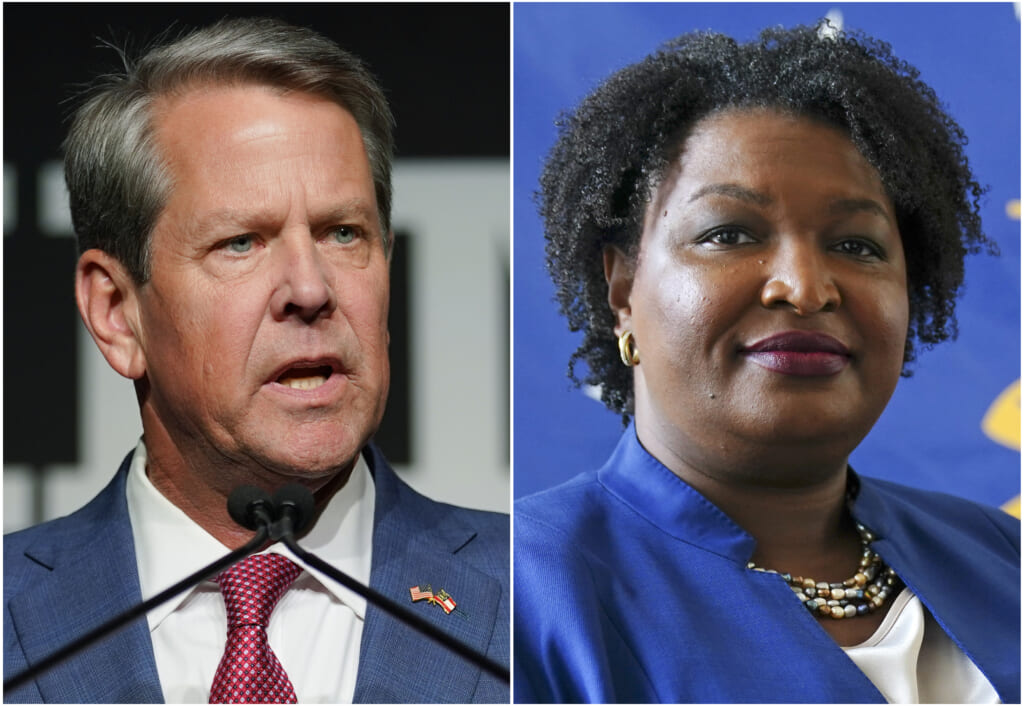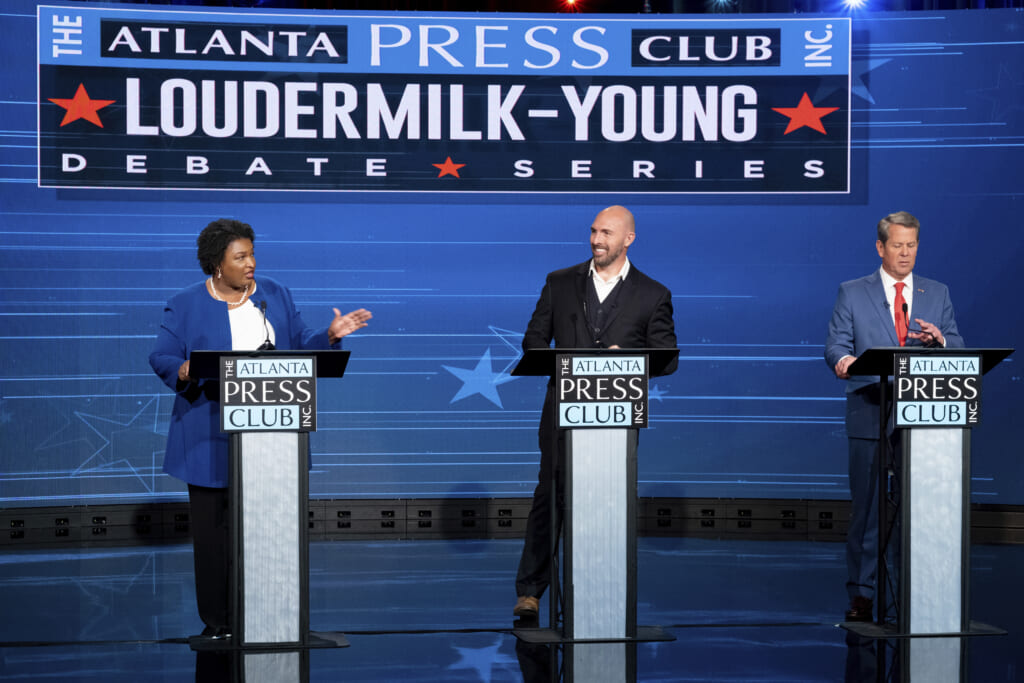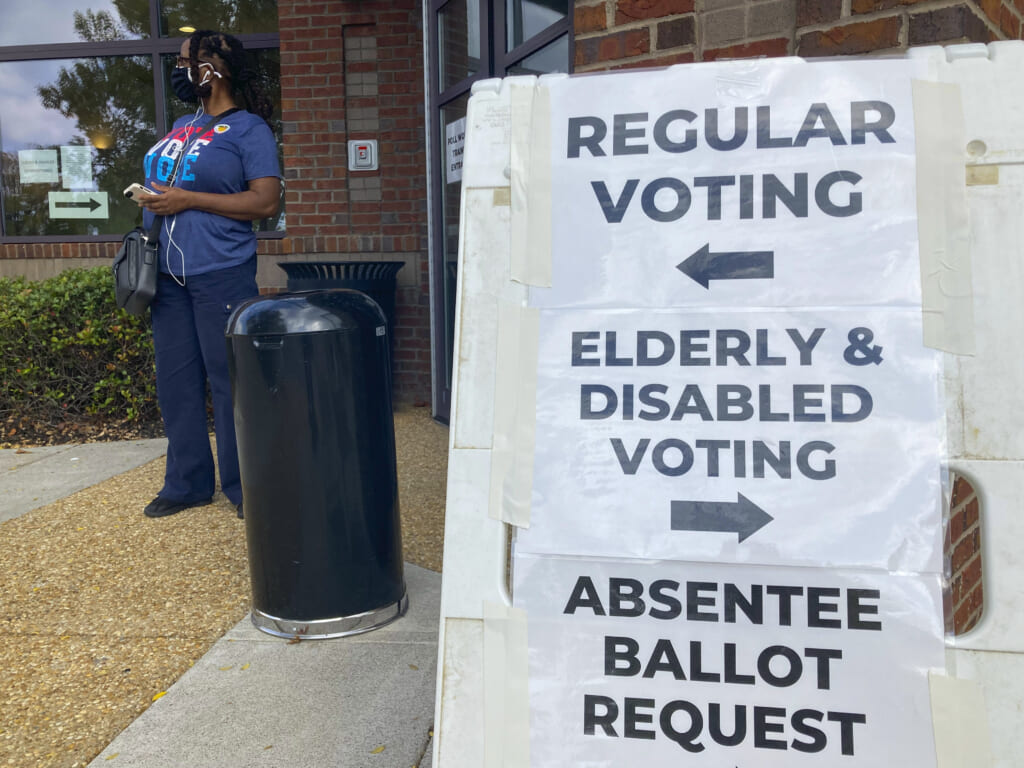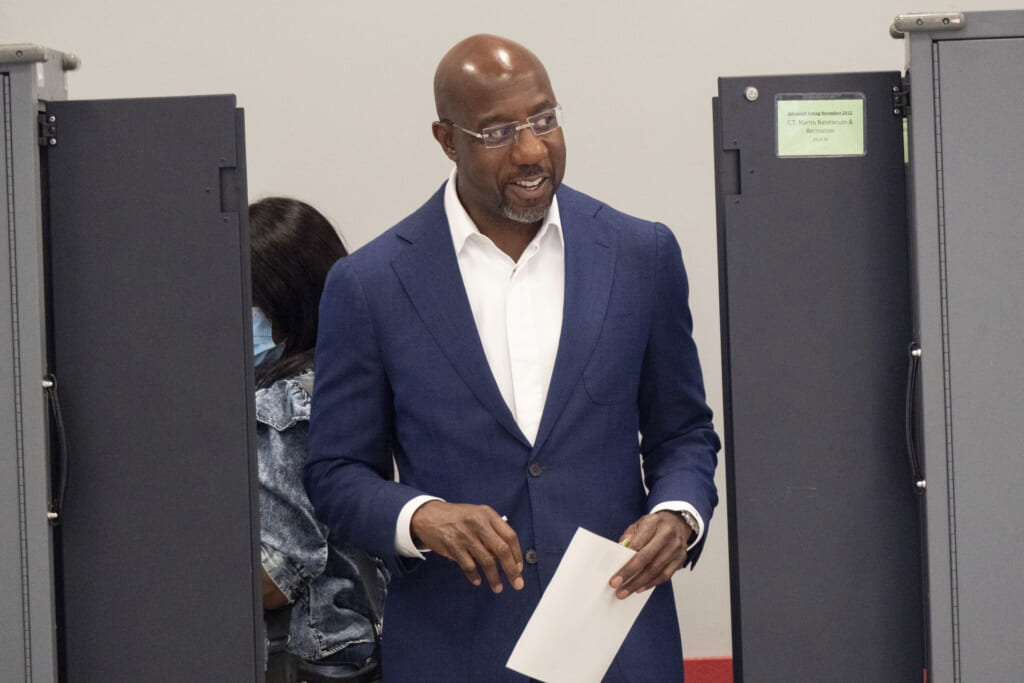At Georgia debate, Abrams and Kemp clash on abortion, crime
Kemp and Abrams are scheduled to meet for a second debate on Oct. 30.
ATLANTA (AP) — Republican Georgia Gov. Brian Kemp and Democratic challenger Stacey Abrams painted different visions for the future of Georgia, clashing on the economy, crime, voting and education as they debated Monday night after more than 100,000 Georgians swarmed to the polls of the first day of early voting.
Kemp issued perhaps his clearest commitment yet that he won’t pursue any new restrictions on abortion or birth control, clarifying his position on an issue he’s sometimes avoided as he seeks a second term.
Abrams, pushing uphill to unseat the incumbent four years after she narrowly lost to Kemp, told voters his record of accomplishments was scant.

“This is a governor who for the last four years has beat his chest but delivered very little for most Georgians,” she said. “He’s weakened gun laws and flooded our streets. He’s weakened … women’s rights. He’s denied women the access to reproductive care. The most dangerous thing facing Georgia is four more years of Brian Kemp.”
Kemp, though, reminded voters that he had delivered billions in tax relief and rebates to millions of Georgians, crediting his decision to reopen Georgia’s economy amid the pandemic for the state’s financial strength and repeatedly blaming Democrats for economic difficulties.
“My desire is to continue to help them fight through 40-year-high inflation and high gas prices and other things that our Georgia families are facing right now financially because of bad policies in Washington, D.C., where President Biden and the Democrats have complete control,” he said.
Kemp said he “would not” go beyond the “heartbeat bill” he signed in 2019 to ban nearly all abortions at six weeks of pregnancy, a point that comes before many women know they’re pregnant. The law took effect after the U.S. Supreme Court in June overturned a constitutional right to abortion services. The Georgia law includes exceptions in cases of rape, incest and health risks to pregnant women.
Abrams has criticized the Republican incumbent as an extremist on abortion, leaving him trapped between moderates who want more permissive abortion laws and activists who want the governor to completely ban abortion or restrict Plan B, an over-the-counter contraceptive that can prevent pregnancy even after an egg is fertilized.
The debate question came after Kemp was captured on tape by a voter pressing Kemp to commit to more restrictions. Kemp sought to quell concerns. “That’s not my desire” to push any new abortion or birth control legislation, he said.

Libertarian Shane Hazel, who was also on the debate stage, interrupted the other candidates several times to get his point across because he wasn’t asked as many questions.
Beyond abortion, Kemp and Abrams rekindled their long-standing feud over voting rights, with Abrams accusing Kemp as governor and previously as secretary of state of trying to make it harder for some Georgians to vote.
Abrams said, however, that she would accept the outcome of the November election after Republicans criticized her for acknowledging Kemp’s 2018 victory but refusing to use the word “concede.”
“I will always acknowledge the outcome of elections, but I will never deny access to every voter, because that is the responsibility of every American to defend the right to vote,” she said.
Kemp urged voters to remember that he was among the Republican governors who relaxed public restrictions early in the COVID-19 pandemic, including resisting widespread mask mandates and school closures during the nation’s worst public health crisis in a century.
“Our economy is incredible … we are the ones that’s been fighting for you when Ms. Abrams was not,” Kemp said.
Still, he found himself on the defensive from Hazel, who blasted Kemp for ever going along with any restrictions and for endorsing the government-distributed COVID-19 vaccine. Abrams defended her criticism of the reopening as showing prudent caution in a pandemic that killed tens of thousands of Georgians.

Abrams and other Democrats have steamed as Kemp has used the power of the governor’s office to spend heavily, noting much of the spending is underwritten by a Democratic COVID-19 relief bill that Kemp opposed. Abrams argues she has a better longer-term vision for Georgia’s economy, pledging a much larger teacher pay raise than the $5,000 Kemp delivered, an expanded Medicaid program, increased access to state contracts for small and minority-owned businesses and broader access to college aid paid for by gambling.
Perhaps the old rivals’ most personal clash came on crime and public safety. Kemp, as he has with his campaign ads, spent considerable effort painting Abrams as an enemy of law enforcement, arguing she has no support from Georgia sheriffs and police. She retorted that it’s possible to support “justice and safety” at the same time and said Kemp has made Georgia more dangerous by making it legal to carry a concealed weapon without a permit.
Earlier Monday, Kemp rolled out a fresh set of anti-crime proposals, including increasing mandatory prison sentences for recruiting juveniles into a gang to at least 10 years and making it harder for judges to release people who have been arrested without cash bail. “That’s what we’re doing, going after street gangs,” Kemp said.
Abrams recalled a 2021 gun massacre at Asian-owned massage parlors in metro Atlanta. “Street gangs did not shoot six Asian women, going into a gun store, getting a weapon and murdering six women,” she said. “Street gangs aren’t the reason people are getting shot in parking lots and grocery stores and in schools.”
Monday’s debate took place as Georgians began flooding the polls for 19 days of early in-person voting. Herb McCaulla, who owns a business selling pop culture memorabilia, praised Kemp on the economy.
“He’s doing a great job,” McCaulla said in Lilburn in suburban Atlanta. “He kept this state afloat during the COVID craziness.”

Democrats said they opposed Kemp over abortion restrictions and loosened gun laws.
“I want Kemp out,” Chalmers Stewart said.
More than 4 million people could vote in the state’s elections this year, and more than half are likely to cast ballots before Election Day. Gabriel Sterling, an official with the Georgia secretary of state’s office, said more than 100,000 people cast early votes Monday. Sterling said that surpassed a previous record of 72,000 for a midterm cycle.
More than 200,000 people have requested mail ballots already, with an Oct. 28 deadline to request them. Early in-person voting will run through Nov. 4.
Kemp and Abrams are scheduled to meet for a second debate on Oct. 30.
TheGrio is FREE on your TV via Apple TV, Amazon Fire, Roku, and Android TV. Please download theGrio mobile apps today!
More About:Politics




